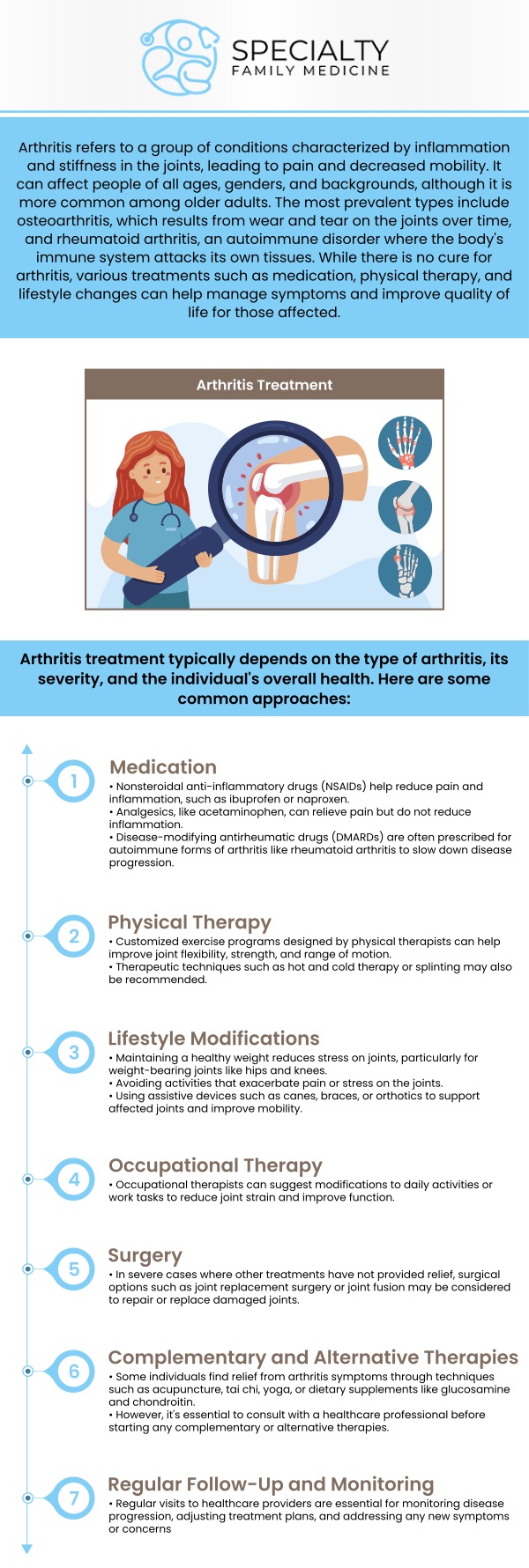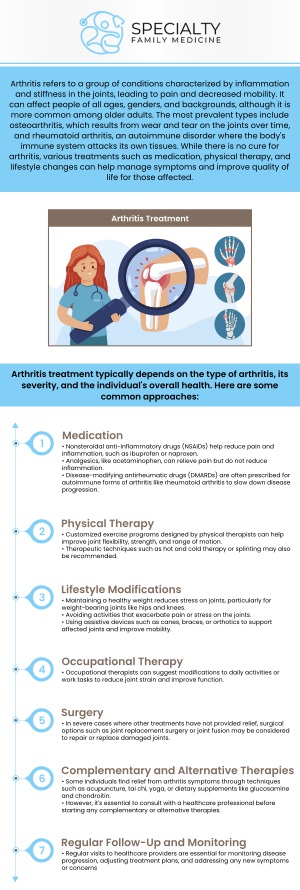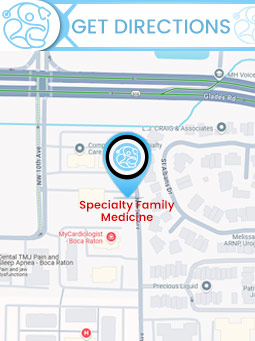Arthritis Treatment Doctor in Boca Raton, FL
Arthritis is a condition that causes inflammation and pain in the joints, affecting movement and flexibility. It can result from various causes, including aging, autoimmune disorders, and injury. At Specialty Family Medicine, Board-certified Dr. Ayokunle Fatade offers personalized care to manage symptoms, improve joint function, and slow the progression of the disease. For more information, contact us today or schedule an appointment online. We are conveniently located at 1599 NW 9th Ave, Suite 4, Boca Raton, FL 33486.


Table of Contents:
What causes arthritis?
What are the symptoms of arthritis?
What are the common types of arthritis?
How can arthritis pain be managed?
How Does Dr. Ayokunle Fatade Approach Arthritis Pain Management for Long-Term Relief?
Why Choose Specialty Family Medicine for Your Arthritis Care in Boca Raton?
Arthritis is a condition characterized by inflammation in the joints. The causes of arthritis can vary depending on the type. Common causes include:
• Genetics: Some types of arthritis, like osteoarthritis and rheumatoid arthritis, may run in families due to inherited genetic factors.
• Injury: Previous joint injuries can lead to conditions like post-traumatic arthritis, which develops after an injury that affects the joint.
• Age: The risk of arthritis increases with age, especially in conditions like osteoarthritis, where cartilage in the joints wears down over time.
• Autoimmune Diseases: In diseases like rheumatoid arthritis, the immune system mistakenly attacks the joints, leading to inflammation and pain.
• Infections: Certain infections, like bacterial or viral infections, can lead to septic arthritis, causing joint inflammation.
• Obesity: Excess weight puts added pressure on the joints, particularly in weight-bearing areas like the knees, increasing the risk of arthritis.
Early diagnosis and treatment can help manage symptoms and slow the progression of the disease, reducing pain and improving joint function.
The symptoms of arthritis can vary depending on the type and severity, but common signs include:
• Joint Pain: Persistent pain in the affected joints, which may worsen with movement or activity.
• Stiffness: Reduced range of motion and joint stiffness, especially in the morning or after periods of inactivity.
• Swelling: Inflammation around the joints, often making them appear swollen and tender to the touch.
• Redness and Warmth: The affected joint may appear red and feel warm due to inflammation.
• Fatigue: Many individuals with arthritis experience general fatigue or a feeling of being unwell.
• Difficulty Moving: The pain and stiffness can make it hard to move the affected joint or perform daily tasks.
• Decreased Range of Motion: A limitation in the ability to move the joint through its full range due to pain or inflammation.
These symptoms can fluctuate in severity, often worsening during flare-ups and improving during periods of remission.
Arthritis encompasses a variety of conditions, each with distinct causes and symptoms. Here are some of the most prevalent types:
• Osteoarthritis: The most widespread form, osteoarthritis occurs when the cartilage that cushions the ends of bones begins to deteriorate over time. This leads to pain, stiffness, and swelling, particularly in weight-bearing joints like the knees, hips, and spine.
• Rheumatoid Arthritis (RA): A chronic autoimmune disorder, RA causes the body’s immune system to mistakenly attack the joints, leading to inflammation, pain, and progressive joint damage, particularly in the hands, wrists, and knees.
• Psoriatic Arthritis: Linked to the skin condition psoriasis, psoriatic arthritis causes joint pain, swelling, and changes in skin appearance, such as red patches and scaling, typically affecting the fingers, toes, and spine.
• Gout: A form of arthritis triggered by the accumulation of uric acid crystals in the joints, gout results in sudden, severe pain, most commonly in the big toe. It often occurs due to dietary habits or kidney issues.
• Ankylosing Spondylitis: Primarily affecting the spine, this chronic inflammatory disease leads to stiffness, pain, and potential fusion of the vertebrae, impacting posture and mobility.
• Lupus (Systemic Lupus Erythematosus): An autoimmune condition that can cause joint pain along with a wide range of systemic symptoms, such as skin rashes, fatigue, and organ involvement.
Each form of arthritis has unique characteristics and requires an individualized treatment plan to address both the symptoms and underlying causes effectively.
Managing arthritis pain focuses on reducing inflammation, relieving pain, and improving joint function. Common management strategies include:
• Medications: Over-the-counter pain relievers, like acetaminophen or NSAIDs, can help alleviate pain and reduce inflammation. Prescription medications and biologics may be used for autoimmune forms like rheumatoid arthritis.
• Physical Therapy: Strengthening exercises and joint mobility exercises can improve function and reduce pain. A physical therapist can develop a personalized plan.
• Hot and Cold Therapy: Heat can help relax stiff muscles, while cold therapy can reduce swelling and numb pain in the affected joints.
• Lifestyle Changes: Maintaining a healthy weight reduces stress on the joints, while a balanced diet rich in anti-inflammatory foods can help manage symptoms.
A combination of these approaches, tailored to the type and severity of arthritis, can help manage pain and improve overall quality of life.
Dr. Ayokunle Fatade, a board-certified family medicine physician, takes a personalized approach to arthritis pain management by combining thorough assessments, medication, physical therapy, and lifestyle adjustments. His goal is to reduce pain and improve joint function through tailored treatments. By focusing on both immediate and ongoing care, Dr. Fatade helps patients manage arthritis effectively and improve their quality of life.
When it comes to managing arthritis, choosing the right provider is essential for long-term relief and improved quality of life. At Specialty Family Medicine in Boca Raton, we offer a compassionate and comprehensive approach to arthritis care, led by board-certified Dr. Ayokunle Fatade. Our team is dedicated to providing personalized treatment plans that address your unique needs, ensuring you receive the best possible care to manage pain, maintain mobility, and live comfortably. Whether you’re dealing with mild discomfort or more severe symptoms, we are here to help you achieve lasting relief and a more active lifestyle.
Personalized Treatment Plans for Arthritis
At Specialty Family Medicine, we know that arthritis affects each person differently, which is why we offer individualized treatment plans. Dr. Ayokunle Fatade takes the time to understand your specific symptoms, goals, and lifestyle to create a tailored approach that works best for you. Whether through medication management, physical therapy, or lifestyle changes, we ensure your plan is designed to provide relief and improve function.
Comprehensive Care for Long-Term Relief
Managing arthritis requires a holistic, long-term approach. We focus not just on alleviating immediate symptoms, but also on providing ongoing care to prevent flare-ups and promote joint health. From pain management to wellness strategies, we work with you to keep arthritis under control, allowing you to live a more active and comfortable life.
Dedicated to Your Well-Being
At Specialty Family Medicine, our priority is your health. We offer a patient-centered approach that combines medical expertise with empathy, ensuring that your arthritis care goes beyond just treating the condition—it’s about helping you live your life to the fullest.
For more information, contact us today or schedule an appointment online. We are conveniently located at 1599 NW 9th Ave, Suite 4, Boca Raton, FL 33486. We serve patients from Boca Raton FL, Highland Beach FL, Lighthouse Point FL, Kings Point FL, Delray Beach FL, Deerfield Beach FL, Boynton Beach FL, and surrounding areas.

Additional Services You May Need

Additional Services You May Need
▸ Back Pain
▸ Neck Pain
▸ Neuropathy
▸ Arthritis
▸ Sciatica
▸ Chronic Pain
▸ Motor vehicle accident
▸ Crohn’s Disease
▸ Parkinsons
▸ Post Surgical Pain
▸ Headaches
▸ Migraines
▸ Achilles Pain
▸ Foot Pain
▸ Plantar Fasciitis
▸ Elbow Pain
▸ Tennis Elbow
▸ Joint Pain
▸ Shoulder Pain
▸ Irritable Bowel Syndrome
▸ Overweight/Obesity
▸ Chest Pain Syndrome
▸ Osteoporosis
▸ Endometriosis
▸ Menstrual Pain
▸ Rheumatoid Arthritis






